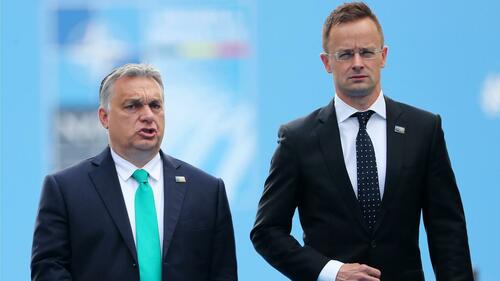EU Fails To Agree On Travel Ban For Russians As Leaders Chafe Over Bloc’s ‘Unanimity Rule’
A European Union meeting of foreign and defense ministers this week has failed to agree on a bloc-wide visa ban for Russians, after Poland, Finland, as well as Baltic countries pushed for a blanket ban on all entrances for Russian nationals – whether for tourism or business. Ukraine’s President Zelensky has been lobbying European capitals to move through with the ban, even if just on individual country levels.
Proponents cast allowance of Russian travel within the EU as some kind of reward: “There must be more restrictions on travel for Russian citizens,” Latvian Defense Minister Artis Pabriks said. “We cannot simply give bonuses to people which are supporting such presidents as Putin,” he told reporters in Prague, where the EU meeting is taking place. But coming out of Wednesday’s meeting Hungarian Foreign Minister Peter Szijjarto was the first to announce that the policy measure has failed to gain necessary unity, after those who opposed were led chiefly by Hungary and Germany. EU leaders did still, however, tried to spin this as a “win”:
EU’S BORRELL: EU MEMBERS POLITICALLY AGREE TO FULLY SUSPEND FACILITATION AGREEMENT FOR RUSSIAN VISAS
EU WON’T RECOGNIZE PASSPORTS ISSUED BY RUSSIA IN OCCUPIED AREAS
Hungary’s Prime Minister Viktor Orbán (L) and Hungary’s Foreign Minister Péter Szijjártó, EPA-EFE
Russian state media is also reporting based on regional sources:
There was “no consensus” among EU member states on the proposed full ban for Russian tourists, Hungarian Foreign Minister Peter Szijjarto said on Wednesday, as quoted by a journalist from news agency MTI.
As for the latter country, Chancellor Olaf Scholz, was recently on record as saying “there are a lot of people fleeing from Russia because they disagree with the Russian regime” – thus it would unfairly punish all Russians no matter their viewpoints of Putin’s war, including journalists.
Going into the talks, EU foreign policy chief Josep Borrell strongly suggested the Russian travel ban is unlikely to happen. Days ago he stressed in a speech, “More than 300,000 Russians have [fled] their country because they don’t want to live under the rule of [Russian President Vladimir] Putin. Are we going to close the door to these Russians? I don’t think it’s a good idea.”
Such a policy would likely eventually involve kicking out a lot of people too as visas wouldn’t be renewed under the proposal. Last Thursday the European Union’s border agency Frontex issued updated numbers on how many Russians it had tracked entering EU borders during the six months since the invasion of Ukraine began. It said nearly 1 million Russian citizens entered the EU since that time, or more precisely a total of 998,085 Russian passport holders had entered since Feb. 24.
Some European officials have suggested a more nuanced approach and limited ban:
German Foreign Minister Annalena Baerbock expressed support for suspending more parts of the 2007 EU agreement with Russia, and to halt the issuing of multiple-entry or multi-year visas.
But Baerbock said it’s important “that we don’t deprive ourselves of what made it possible for us to allow persecuted people in Russia to leave very quickly.”
Meanwhile, on a related note to EU law and policymaking, controversy over so-called rule of law mechanism and the need for greater reforms is back, as German Chancellor Olaf Scholz in a speech given at Charles University in Prague stressed the need to get rid of the requirement for unanimity when it comes to EU-wide binding decisions. The idea is that ‘back-slidden’ democracies like Hungary should no longer hold veto power.
“we know that the EU must reform to be able to operate efficiently and effectively in a wider Europe. This concerns institutional governance, as well as decision making, such as reconsidering the unanimity rule” – French Minister for Europehttps://t.co/SIv1QiilWD
— David Phinnemore (@DPhinnemore) August 25, 2022
According to one report covering the speech, those seeking to abandon the unanimity rule wish to take aim at the more conservative and traditional countries like Hungary and Poland:
In effect, Scholz is pushing to get rid of the veto power of member states. Currently, all member states must agree on a course of action, and if one member state rejects that course of action, they can issue a veto. Such a move would represent a major threat to countries like Hungry and Poland, which have come under extreme pressure on issues such as LGBT ideology, migrant quotas, taxation rules regarding a global minimum tax, and energy policy — just to name a few key areas.
France too has long been critical of the unanimity rule. The controversy comes at a moment both EU and NATO leadership is calling on EU populations to harden their resolve against what is set up to be a winter of hardship, given Russian energy cut-offs and uncertainty over whether the heat and lights will stay on in major European cities.
Tyler Durden
Wed, 08/31/2022 – 09:26

